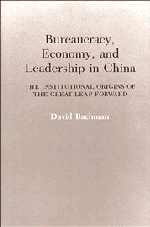1 - Introduction
Published online by Cambridge University Press: 21 March 2010
Summary
One of Mao Zedong's more memorable post-1949 sayings was “Where do correct ideas come from?” They do not fall from the sky, he stated, nor are they innate in the minds of men. Instead, he argued, correct ideas emerge from social practice, and social practice alone. Using the terminology of present-day political science, Mao's words might be paraphrased: “Where do political preferences come from?” This book takes the position that preferences and policies in China also emerge from social practice, and uses this insight to examine the interplay of economic, bureaucratic, and leadership factors that gave rise to the Great Leap Forward (GLF) of 1958–1960. Particular attention is paid to the period from September 1956 to October 1957, one of the great turning points in the history of the People's Republic of China (PRC).
Beginning in mid 1956, and greatly accelerating after the Eighth National Congress of the Chinese Communist Party (CCP) in September 1956, reformist ideas appeared on China's political agenda. In the economic realm, Chinese leaders called for the market to supplement the planned economy and challenged the heretofore dominant position of heavy industry as China's top economic priority. The leaders may also have tried to orient their country's foreign trade toward broader relations with noncommunist nations. In the political realm, even more fundamental changes were considered. For a brief time during the Hundred Flowers Campaign, the Party encouraged Chinese citizens, especially intellectuals, to come forward and voice their opinions about the state of the nation.
- Type
- Chapter
- Information
- Bureaucracy, Economy, and Leadership in ChinaThe Institutional Origins of the Great Leap Forward, pp. 1 - 10Publisher: Cambridge University PressPrint publication year: 1991



